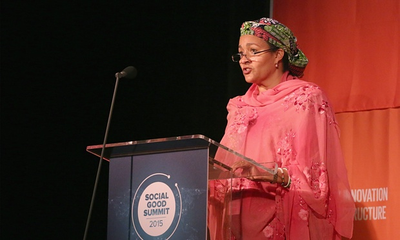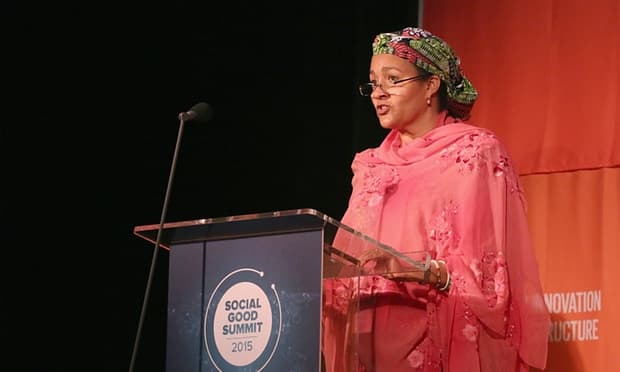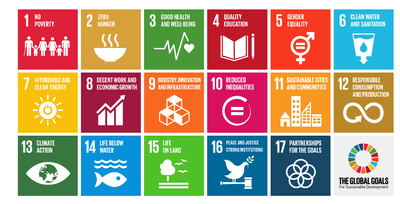Sustainable Development: $100bn? A drop in the ocean, says environment minister Amina Mohammed – Nigeria’s new environment minister, Amina Mohammed, was hailed this month as one of the world’s leading female “climate warriors” in the fight against global warming in a Vogue magazine photoshoot. She could, however, be forgiven for feeling a little battle-weary.

She was Ban Ki-moon’s right-hand woman during the fraught negotiations for the sustainable development goals (SDGs) as his special adviser on post-2015 development planning. She was still in New York last month when she got a call from President Buhari, asking her to return to Nigeria to be his environment minister rather than serve out her contract with the UN until the end of the year.
Two weeks into the job, she is in Paris on another high-stakes mission; heading up the negotiations team of Africa’s most important economy at the Cop 21 climate talks.
If she is feeling the strain, Mohammed does a good job of not showing it. She sees the climate negotiations as a chance to make sure that the baby she helped deliver – the 17 global goals hammered out in New York – get the financial backing they need to survive.
And she has brought to Paris the same artillery of cogent and passionate arguments she deployed in New York, warning about the need to battle inequality and exclusion and bring women fully into decision-making.
Getting a global agreement on climate change, she says, “is the last of the obligations we have to make history in terms of achieving the SDG agenda”. The three and a half years of hard work it took to come up with SDGs means much of the heavy-lifting to get an equitable climate change agreement has already been done, she says: “Everything you see in terms of the climate change agenda you see in the SDGs. But it needs to be put into a framework that commits people to the investments needed to enable low-carbon growth.” That is what is at stake here in Paris.
Mohammed lists what would constitute a success in Paris: a legally-binding agreement that holds emissions below 2C, a strong review mechanism to ensure countries stay on the path to cutting their emissions, and clarity about a commitment made last year that the developed world will spend $100bn annually on climate finance in the global south by 2020.
The last is non-negotiable, Mohammed says: “You can’t keep telling me it’s a lot of money. It’s a drop in the ocean. We have an over $70tn global economy and you are balking at spending $100bn for saving lives?”
Mohammed said the situation will only get worse as global temperatures rise. “In Nigeria, the drying up of Lake Chad and coastal erosion at the other end of the country has pushed the population into a smaller space, creating poverty, landlessness and increasing conflict.” This has contributed to the rise of the homegrown jihadi group Boko Haram, responsible for the deaths of thousands of people.
The attacks in Paris a couple of weeks ago have brought home to many delegates the very real threat to global security posed by terrorism and the ongoing migration crisis.
“We are scampering around trying to do something about migration [but] there’s a very easy solution: deal with the root causes. That means investing in people in the destinations in Africa and south-east Asia where they are coming from, and where they would stay if they had an alternative. This isn’t a begging bowl. It’s an investment in global peace and security and prosperity.”
Nigerian women cook in a refugee camp in Baga Sola by Lake Chad. The drying up of the lake and coastal erosion at the coast has contributed to the rise of Boko Haram, responsible for the deaths of thousands of people. Photograph: Sia Kambou/AFP/Getty Images
And $100bn is only a starting point, she says. “The $100bn we are asking for is a signal from the international community that they are serious about the financing challenge for climate change. We need trillions, not billions. The first one hundred billion is the signal that trillions will be attainable.”
So where are the trillions going to come from? Among her many speaking events at Cop 21, Mohammed turned up last week at the launch of Climate Investor One, the first project of an innovative financing mechanism funded by the Green Climate Fund, and backed by the Department of Energy and Climate Change (DECC) to the tune of £50m. The $150m fund is designed to invest in all stages of renewable energy projects in some of the poorest countries, removing some of the risk that has deterred investors and prevented such projects from getting off the ground. It expects to be able to mobilise $2bn in private investment finance by 2020.
Mohammed says such finance will be critical if Nigeria is to realise its plans to diversify from an oil-based economy to one powered by renewables. Despite the fact that Nigeria is Africa’s biggest energy producer, the country’s electricity infrastructure needs vast amounts of investment – only 40% of people are connected to the grid, and even they only get power 60% of the time.
Mohammed points out that Nigeria’s population of 170m is expected to surpass that of the US by 2050. “We have got the population. We have got the natural resources. We will exploit them,” she says. “Do you want us to burn coal or use renewable energy. Someone has to pay for that.”
But big lenders, such as pension funds, will only be prepared to invest the sums African countries require, she says, if the risks of policy somersaults, frequently changing governments, and institutional corruption can be lowered.
The last point is particularly pertinent for Nigeria, where endemic corruption has enriched the elite and siphoned billions of dollars abroad, leaving most Nigerians in poverty despite the country’s oil riches, according to Transparency International.
Buhari was elected in April, promising to root out corruption and regain public trust in government. If anyone is going to help him, it will be Amina Mohammed, who is the furthest one could imagine from the image of an indolent politician grown rich on petro-dollar back-handers.
At the mention of the black and white Vogue photoshoot of climate warrior women, Mohammed seems embarrassed. “Oh my God. And all of us are over 50,” she laughs, adding that she is the mother of six children, aged between 16 and 34. But she says it is a reflection of the seriousness of the climate change issue that age doesn’t seem to matter, even for Vogue.
Gender, on the other hand, does matter, and Mohammed sees Africa’s women as the untapped power for change. “We need to put women at the centre of decision making. This is not a question of saying that it’s our right as 50% of the population. Over and over again we are realising that climate change is manmade because it is the result of decisions taken by men.” A women-directed future could be very different.




